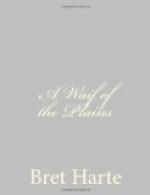“I mean,” continued the priest, with a slight cough, “let the thoughtful man picture a father: a desperate, self-willed man, who scorned the laws of God and society—keeping only faith with a miserable subterfuge he called ‘honor,’ and relying only on his own courage and his knowledge of human weakness. Imagine him cruel and bloody—a gambler by profession, an outlaw among men, an outcast from the Church; voluntarily abandoning friends and family,—the wife he should have cherished, the son he should have reared and educated—for the gratification of his deadly passions. Yet imagine that man suddenly confronted with the thought of that heritage of shame and disgust which he had brought upon his innocent offspring—to whom he cannot give even his own desperate recklessness to sustain its vicarious suffering. What must be the feelings of a parent—”
“Father Sobriente,” said Clarence softly.
To the boy’s surprise, scarcely had he spoken when the soft protecting palm of the priest was already upon his shoulder, and the snuffy but kindly upper lip, trembling with some strange emotion, close beside his cheek.
“What is it, Clarence?” he said hurriedly. “Speak, my son, without fear! You would ask—”
“I only wanted to know if ‘padre’ takes a masculine verb here,” replied Clarence naively.
Father Sobriente blew his nose violently. “Truly—though used for either gender, by the context masculine,” he responded gravely. “Ah,” he added, leaning over Clarence, and scanning his work hastily, “Good, very good! And now, possibly,” he continued, passing his hand like a damp sponge over his heated brow, “we shall reverse our exercise. I shall deliver to you in Spanish what you shall render back in English, eh? And—let us consider—we shall make something more familiar and narrative, eh?”
To this Clarence, somewhat bored by these present solemn abstractions, assented gladly, and took up his pen. Father Sobriente, resuming his noiseless pacing, began:
“On the fertile plains of Guadalajara lived a certain caballero, possessed of flocks and lands, and a wife and son. But, being also possessed of a fiery and roving nature, he did not value them as he did perilous adventure, feats of arms, and sanguinary encounters. To this may be added riotous excesses, gambling and drunkenness, which in time decreased his patrimony, even as his rebellious and quarrelsome spirit had alienated his family and neighbors. His wife, borne down by shame and sorrow, died while her son was still an infant. In a fit of equal remorse and recklessness the caballero married again within the year. But the new wife was of a temper and bearing as bitter as her consort. Violent quarrels ensued between them, ending in the husband abandoning his wife and son, and leaving St. Louis—I should say Guadalajara—for ever. Joining some adventurers in a foreign land, under an assumed name, he pursued his reckless course, until, by one




